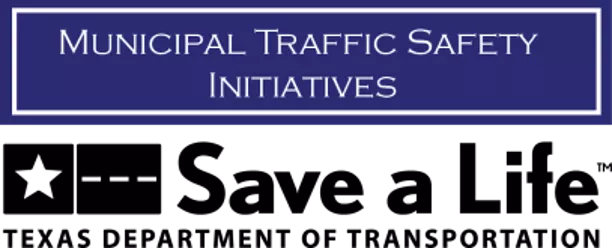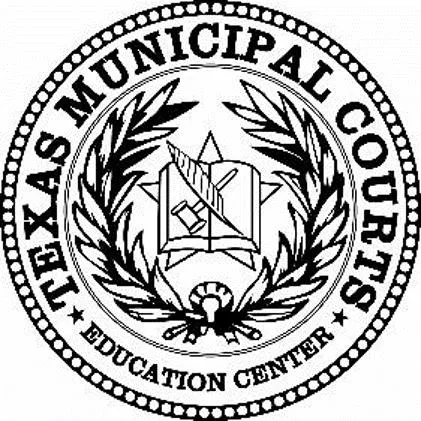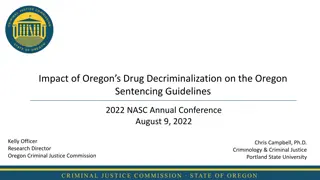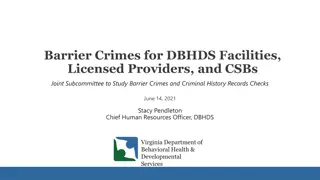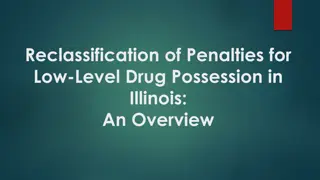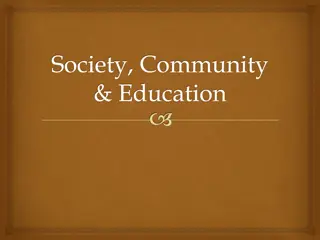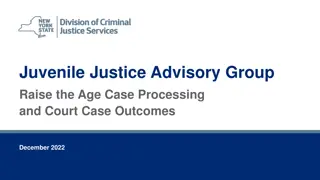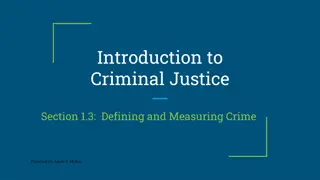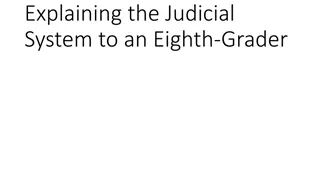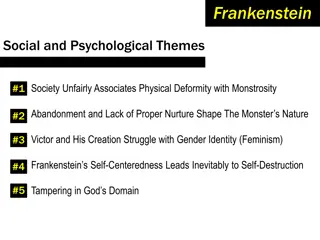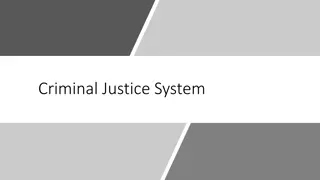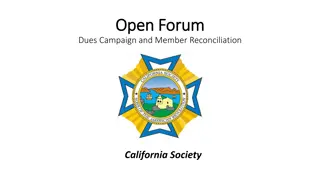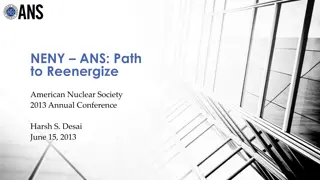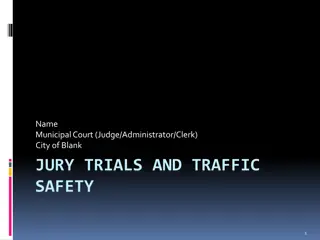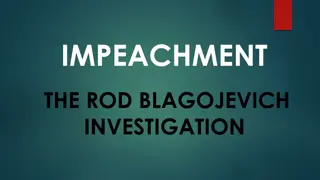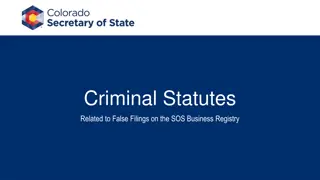Understanding Misdemeanors: Types, Consequences, and Impact on Society
Misdemeanors are crimes punishable by fines, jail time, or both, with varying degrees of severity. This article explores the differences between misdemeanors and felonies, provides examples of misdemeanors in Texas, outlines the consequences for defendants, including fines and potential jail time, and discusses the broader societal impact of misdemeanors. From financial penalties to social stigma, misdemeanors can have lasting repercussions on individuals and communities.
Download Presentation

Please find below an Image/Link to download the presentation.
The content on the website is provided AS IS for your information and personal use only. It may not be sold, licensed, or shared on other websites without obtaining consent from the author. Download presentation by click this link. If you encounter any issues during the download, it is possible that the publisher has removed the file from their server.
E N D
Presentation Transcript
Misdemeanors Misdemeanors Matter Matter
What is a Misdemeanor? A misdemeanor is a crime punishable by a fine, jail time for a period of up to a year, or both Felonies, on the other hand, carry fines and prison time of a year or more
What is a Misdemeanor? While less serious than felonies, misdemeanors are NOT insignificant offenses! While there has been a recent push by the media and certain advocacy groups to downplay the misdemeanor offenses, these offenses have direct negative consequences to individuals and society seriousness of
Texas Misdemeanors Examples Class C Misdemeanors: DUI (under 21), theft, minors consuming or possessing alcohol, public intoxication, criminal trespass, speeding and many other traffic violations Class B Misdemeanors: DWI (first offense), minors possessing drugs, vandalism, evading arrest on foot Class A Misdemeanors: DWI (second offense), assault with bodily injury, possession of 2-4 ounces of marijuana, unlawfully carrying a weapon
Misdemeanor Consequences to Defendant Class C Misdemeanors: Fine up to $500* Class B Misdemeanors: Fine up to $2,000, jail up to 180 days, up to two years community supervision (probation) Class A Misdemeanors: Fine up to $4,000, jail up to one year, up to two years community supervision (probation)
Further Misdemeanor Consequences to the Defendant Non-court imposed consequences of misdemeanors might include: Surcharges against defendant s drivers license Court costs and fees to be paid by the defendant Increased car insurance premiums Attorney fees to be paid by the defendant Inclusion of the offense on the defendant s criminal record, which makes it harder to obtain employment Negative effect on credit score Social stigma
Misdemeanor Consequences to Society The following traffic misdemeanors effectively illustrate the negative consequences misdemeanors have on society: Impaired Driving Speeding Traffic Signal Violations Not Wearing a Seat Belt
DUI and DWI (Alcohol) In 2015, approximately 35,092 were killed and 4.4 million seriously injured in auto crashes in the U.S. Of these deaths, 12,130 (35.35%) involved a driver who had been drinking alcohol (usually a misdemeanor offense!) This means that in 2015, more than 33 people died every day from alcohol-related crashes Sources: National Safety Council, National Highway Traffic Safety Administration
Speeding Of the 2015 deaths, 9,557 (27%) involved a driver that was speeding (a misdemeanor!) Source: National Highway Traffic Safety Administration
Traffic Signal Violations From 2011 to 2015, an average of 719 people died each year from red light running (a misdemeanor!) crashes In 2014, 709 were killed and approximately 126,000 were injured in stop sign running (a misdemeanor!) crashes Source: American Traffic Solutions, Insurance Institute for Highway Safety
The loss of life is not only those who have committed misdemeanors, but also those following the law who are killed by those committing misdemeanors. Notice anything about the previous video?
Seat Belts In 2015, 7,221 drivers and 2,452 passengers died in car crashes that were not wearing a seatbelt (a misdemeanor!) Seat belts saved an estimated 12,802 lives in 2014 Trivia: How might not wearing a seatbelt affect other vehicles? Source: Insurance Institute for Highway Safety
Misdemeanor Consequences to Society The loss of life illustrated by the statistics discussed is not only those who have committed misdemeanors, but also those following the law who are killed by those committing misdemeanors Annually, traffic crashes have an estimated economic impact of $242 billion ($242,000,000,000.00!) on society With that amount, you could buy almost 9 million Ford F-150 pickup trucks! Question: Does anyone benefit here? What is lost? Source: Insurance Institute for Highway Safety
The Vital Role of Municipal Courts in Texas More people come into contact with municipal courts than all other levels of the Texas judiciary combined Over 5 million misdemeanor cases are filed in Texas municipal courts per year As we will see, misdemeanors have a significant negative effect on individuals and society at large, making the role of municipal courts VITAL Source: Annual Statistical Reporting of the Texas Judiciary


